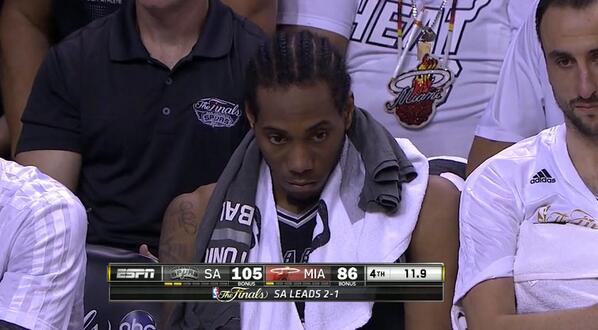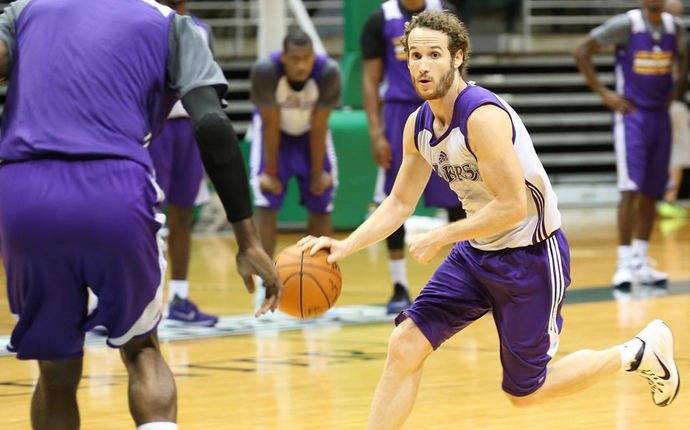Re: March Madness - Final Four
Esse brasileiro Peyton Silva eu curti.
Discussão geral sobre a liga universitaria americana, projeções e futuros drafts da NBA
Moderadores: MatheusK, What's Up, Doc?
michigan já foi campeão pô acho que 1989Pedrox77 escreveu:Queria que Michigan ganhasse seu primeiro titulo, mas foi merecido ! Venceu o melhor conjunto

Pelo outro lado o Burke sempre genial, esse cara é o novo CP3!
Ta sabendo legal ein Keynes. Burke pelo o que acompanhei considero o melhor armador do draft, na frente até do Smart. Jogo muito parecido com o jogo do Damian Lillard e o Lillard não pontua sem ligar pra mais nada, comparação estranha a sua, até porque o Kemba considero um ótimo jogador.Matheus Keynes escreveu:Pelo outro lado o Burke sempre genial, esse cara é o novo CP3!

O cara tá muito mais pra uma combinação de Kemba Walker com Marcus Thornton. Deve ser um bom sixth man, um garoto pra vir do banco e pontuar sem ligar mais pra nada.


Verdade, falha minha não lembrava dessa , assisti o Fab 5 esses dias e fiqui com a imagem do bi vicePontiacSilverDome escreveu:michigan já foi campeão pô acho que 1989Pedrox77 escreveu:Queria que Michigan ganhasse seu primeiro titulo, mas foi merecido ! Venceu o melhor conjunto

How Money Is March Madness? A New Marketplace Podcast
Our latest Freakonomics Radio on Marketplace podcast is called “How Money Is March Madness?” (You can download/subscribe at iTunes, get the RSS feed, listen via the media player above, or read the transcript below.)
The gist: the annual NCAA basketball tournament grabs a lot of eyeballs, but turning them into dollars hasn’t always been easy — even when the “talent” is playing for free.
Last year, March Madness reportedly earned its highest TV ratings in 18 years. This year’s Super Bowl, meanwhile, was the third most-watched broadcast in TV history (behind two earlier Super Bowls), despite (or because of?) an electrical blackout. Interestingly — to me, at least — these two premier TV sporting events are sold very differently: the Super Bowl rotates annually among one of three networks while the NCAA is in the midst of a 14-year contract with CBS and Turner Sports. How does that difference affect ad revenue?
That’s one question we try to answer in this piece. In an earlier piece for the NFL Network, we looked at the economics of Super Bowl ad sales. In this piece, we lean on the research firm Kantar Media to see how March Madness measures up. Although he doesn’t appear in the podcast, Jon Swallen of
Kantar was a font of information. He tells us that two years ago, CBS and Turner may have lost money on March Madness, as they pay roughly $770 million a year for broadcast rights but took in only $728 million in TV ad revenue. But last year, Swallen says, CBS and Turner — which broadcast ever single game in the tourney — took in more than $1 billion.
This makes March Madness “the most lucrative sports TV franchise in the country in terms of advertising revenue,” Swallen told us, “bigger than the Super Bowl, bigger than the entire NFL playoffs, and larger than the combined revenue that’s brought in from the Major League Baseball playoffs, plus the NBA, plus the National Hockey League.” That said, broadcasting every game in the tournament of course raises production costs as well, so it’s hard to know just how profitable the enterprise may be.
In the podcast, you’ll also hear from Northwestern economist Jeff Ely (he blogs here), who came up an auction system for Northwestern basketball tickets and thinks that the NCAA and NFL might do well to consider using an auction for selling ad slots. He has an even nuttier idea for how to raise more revenue, which I will not spoil here, but it has something to do with this.

